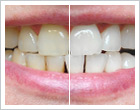Bleaching
Tooth whitening refers to a number of techniques including chemical whitening and mild acid whitening that are used to correct discoloration of the teeth by removing brown and yellow staining. To whiten stained or discoloured teeth, we use one of the many special types of bleach that have been developed for this purpose, varying the strength of the bleaching agent according to the condition and sensitivity of the teeth.First of all we will examine your teeth and gums since it is important to ensure the healthy condition of the oral cavity. Old fillings may need changing; carious teeth will be filled and treated.

Benefits
Teeth whitening makes your smile brighter, often providing a noticeable cosmetic improvement. Age, smoking and drinks such as red wine, coffee and colas can stain or darken tooth enamel. Teeth grinding often causes the bitten edges to have a discoloration. Teeth whitening can help to lighten and brighten the teeth and transform a smile.
Effects
Teeth whitening is not permanent. It is a temporary lightening and brightening of the teeth's enamel. In order to maintain the brightness, repeat treatments are necessary. There are also side effects (most often temporary) that can come along with tooth whitening. These include chemical burns, sensitive teeth and over-bleaching.
Warning
People with receding gums, sensitive teeth or sensitive gums should discuss the use of a teeth-whitening system with their dentist prior to using a product to whiten their teeth. Additionally, anyone allergic to peroxide---the bleaching product used for teeth whitening-should avoid the process. Most importantly, overuse of teeth bleaching and whitening agents can result in tooth enamel damage.
Considerations
Teeth whitening may not work on all teeth. Brownish teeth do not bleach well. Grayish teeth bleach even less well. If you have bonded or tooth-colored fillings, bleaching will not lighten those areas. In fact, it may cause these areas to stand out.